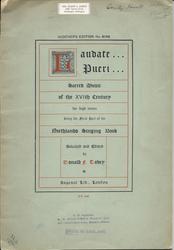I have been visiting the college library book sale daily. In addition to many functional organ pieces and collections, I have found some fun old books and music.
My old desktop computer and scanner are moving so slowly that I don’t have time to scan in a few of the covers, but they are wonderful to hold and look at.
I was reminded of Christopher Small’s comment about music scores.
“A score, of course, is not a musical work. It is not even the representation of it. It is a set of coded instructions that, when properly carried out, will enable performers not only to make sounds in a specific combination, called a musical work, but also to repeat that combination as many times as they desire.”
“We hear the sounds, which means that we perceive the aural images that form in our minds as the result of certain concrete physical events, namely, vibrations of the air as they impinge on our ears, and we perceive their aural characteristics. What we do not hear is the relationships between them.
Relationships are mental, not physical, events.”
“If a musical work exists in the relationships between the sounds as performers make them and as hearers hear them (performers, of course, are hearers also), then it exists only in performance.”
Small doesn’t talk about recording in his discussion very much. He is concentrating on critiquing the current thinking at the end of the last century (He was writing in 1998). But he does specifically address the reification of music.
“Music is not a thing at all but an activity, something people do.”
I have long thought this way myself.
Anyway my writing is being cut short this morning by the speed of my computer (slooooow) so I will close here.
*****
Hendrik Hertzberg: Winning the Semantic War Over “Entitlements” : The New Yorker
There is some excellent writing in this article. Example:
“When it comes to Washington’s current (and to all appearances permanent) fiscal fracas, the semantic weeds are as high as an elephant’s eye and higher than a donkey’s. ”
*****
Bookmarked to read.
*****
